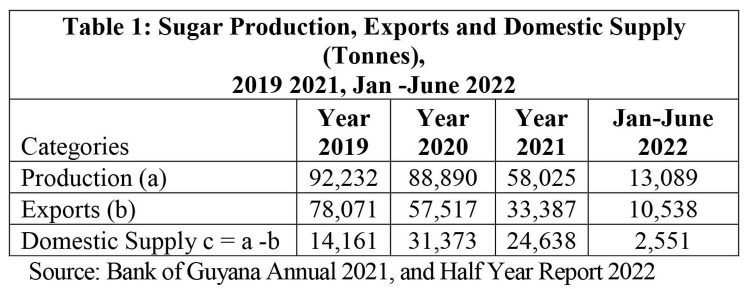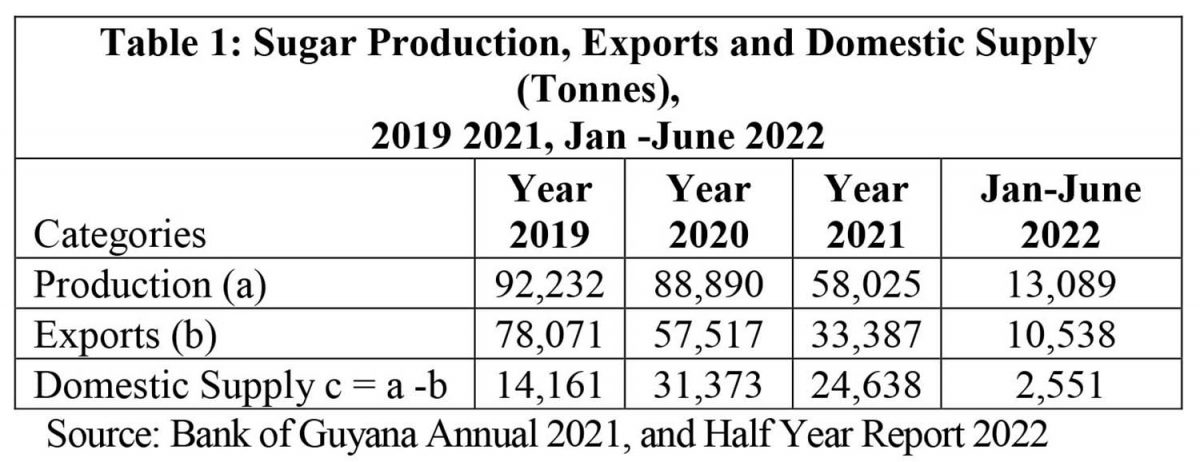Dear Editor,
Referencing your article captioned, ‘GuySuCo warns of Demerara Gold fakes’ (SN 1-15-2023), it is contended ‘…that fake Demerara packaged sugar is in circulation, and on the shelves of some supermarkets in Guyana’. The real concern for GuySuCo is that its monopoly position is being challenged; and therefore, it will not be able to charge a non-competitive price for its product, if sugar imports are allowed. Obviously, lower imported prices will benefit consumers at a time of increasing demand and increasing food prices due to inflation (SN: https://www.stabroeknews.com/2023/01/14/opinion/editorial/big-market-inflation/).
On the assumption that there are no Government sugar import restrictions, and import duties are not violated, it is therefore up to importers to carve-out a segment of the domestic market demand for themselves, given that they could make a profit from selling their imported sugar on the domestic market. The questions which must be addressed are the following: is there a sugar shortage? Given world market prices, is GuySuCo sugar price competitive? Can local importers sell their sugar at or below GuySuCo price? Is GuySuCo a financially viable operation?
On the subject of a sugar shortage in Guyana, it is reported that there was no sugar shortage last year (SN article, dated 8-22-2022, ‘GuySuCo says no shortage of sugar’). It should be pointed out, however, that during the period 2019 to 2021, total sugar production declined, moving downwards from 92,232 tonnes in 2019 to 58,025 tonnes in 2021, with a half year production of only 13,089 tonnes for the period January to June 2022 (Table 1). Consequently, exports and the domestic supply also declined.
 For the period January to June 2022, the production, exports and domestic supply are relatively low, and this may indicate a sugar shortage on the domestic market and the opportunity for local businesses to import sugar. The complaint by GuySuCo that foreign supplies are in the market confirms that a shortage exists and that these sugar imports are in direct competition with the supply by GuySuCo. On the question of domestic prices, the above identified article (SN 8-22-2022) noted that, ‘…the New Guyana Marketing Corporation has been selling packaged sugar directly to final consumers at $150 per pound and $140 per pound for loose sugar in a bid to prevent profiteering by unscrupulous parties.’. This price of G$140 to G$150 per pound or US$0.70 to US$0.75 per pound is expensive relative to what sugar is being sold on the world market. The average world market price for sugar is US$0.18 per pound (ISO, https://www.isosugar.org/prices.php). As a result, there is the incentive and opportunity for local entrepreneurs to fill this gap, ending the shortage with sugar imports at prices equal to or less than the domestic price. In the circumstances, the only path forward is for GuySuCo to become efficient by lowering its average cost of production for a pound of sugar. And a large part of this assignment is related to increasing the per acre sugar yields; but unfortunately, GuySuCo appears not to have the agricultural and management expertise to effect such a transformation.
For the period January to June 2022, the production, exports and domestic supply are relatively low, and this may indicate a sugar shortage on the domestic market and the opportunity for local businesses to import sugar. The complaint by GuySuCo that foreign supplies are in the market confirms that a shortage exists and that these sugar imports are in direct competition with the supply by GuySuCo. On the question of domestic prices, the above identified article (SN 8-22-2022) noted that, ‘…the New Guyana Marketing Corporation has been selling packaged sugar directly to final consumers at $150 per pound and $140 per pound for loose sugar in a bid to prevent profiteering by unscrupulous parties.’. This price of G$140 to G$150 per pound or US$0.70 to US$0.75 per pound is expensive relative to what sugar is being sold on the world market. The average world market price for sugar is US$0.18 per pound (ISO, https://www.isosugar.org/prices.php). As a result, there is the incentive and opportunity for local entrepreneurs to fill this gap, ending the shortage with sugar imports at prices equal to or less than the domestic price. In the circumstances, the only path forward is for GuySuCo to become efficient by lowering its average cost of production for a pound of sugar. And a large part of this assignment is related to increasing the per acre sugar yields; but unfortunately, GuySuCo appears not to have the agricultural and management expertise to effect such a transformation.
On the question of whether or not GuySuCo is a financially viable operation, there is the general view that it is not a financially viable operation; and until the audited financial statements are made public, this analysis will have to be deferred. Nevertheless, as the largest owned government business in Guyana, the Management of GuySuCo must be more forthcoming with the financial information, given that the Government of Guyana has been using tax payers’ money to cover a significant share of its financial liabilities and losses. The Public Accounts Committee should seek to have the audited financial statements and the agricultural program presented for review.
More generally, all government departments must prepare and publish their monthly reports on or before the end of the third week of every month; and these agencies should prepare and publish their annual reports on or before the end of February every year. Additionally, the Auditor General should conclude the audit for all government departments in a timelier manner. Indeed, this reporting and information upgrade is certainly one way to improve transparency and accountability in the use of public funds, for the present system is far less than optimal.
Sincerely,
Dr. C. Kenrick Hunte






